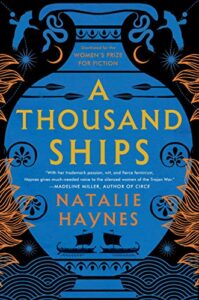
I am a huge fan of epic poetry.
My favourite is the grandaddy of them all, The Iliad.
I’m a sucker for retellings of the classics, particularly from a feminist and/or queer point of view.
So I don’t know why it took me so long to get around to reading this, which is the Homeric epics, non-linearly, from the point of view of the women, including goddesses. The only linear element is the chapters in which the Trojan woman camp on the beach awaiting their fates. The structure is complex yet easy to follow.
This book had me gripped from the first sentence. Calliope, the muse of epic poetry, expresses her exasperation with Homer and epic poets in general, “Sing, Muse, he says, and the edge in his voice makes it clear that this is not a request”. I love Calliope – she’s had just about enough of men’s demands and is caustically funny about it.
The other recurring character is Penelope, back in Ithaca, getting increasingly annoyed as she hears about Odysseus’ mishaps while failing to return home over the years. While this isn’t entirely a book about women who have had quite enough of men’s antics, it’s certainly a main theme.
The prose is beautiful throughout – this is a real joy to read. The chapters are brief but each woman comes across as a complete, fully fleshed out character with a complete back story, hopes and dreams. In particular, the chapter on Laodamia and the blacksmith is utterly heartbreaking.
To me, the original sources for many of the Greek stories that have survived the millennia where women are the villains illustrate exactly the circumstances and injustices that make them the way they are, so I’ve always read them as illustrations of justified female rage, so this book chimed exactly with the way I’ve felt for decades.
There’s also general musings on war, about how it affects the victors, the vanqished and those left behind.
This book is quite simply wonderful. Haynes has written other books set in the ancient world, and I will defintely be readin them too.
